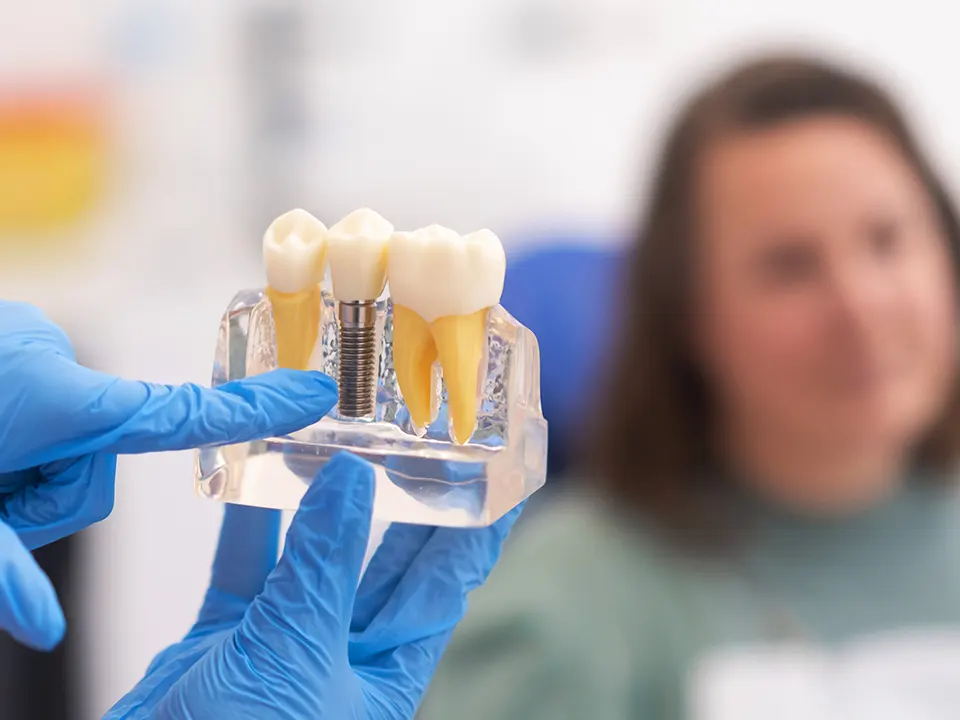
Top 6 Signs of Cavities And What to Do About It
June 16, 2025
5 Signs You Might Be Grinding Your Teeth at Night
August 18, 2025Noticing a bit of blood in the sink after you brush your teeth can be easy to brush off (no pun intended). Maybe you think you brushed too hard, or your gums are just a little sensitive that day. But if your gums bleed regularly, it’s not something you should ignore.
Bleeding gums can be an indicator that something in your mouth isn’t quite right. Sometimes it’s a simple fix, like improving your brushing and flossing habits. Other times, it could be a sign of a bigger problem that needs a dentist’s attention.
Here are 7 reasons why you shouldn’t ignore bleeding gums:
1. Can Be a Sign of Gum Disease
One of the most common causes of bleeding gums is gingivitis, a mild form of gum disease. It happens when plaque builds up along the gumline and causes inflammation of the gums. If left untreated, gingivitis can turn into periodontitis, which is a more serious condition that affects the bone and tissues that hold your teeth in place.
Bleeding is often one of the first warning signs. If your gums are bleeding when you brush or floss, it’s time to take a closer look at your oral health.
2. Your Brushing and Flossing Technique Might Need Work
Sometimes gums bleed because they aren’t used to regular flossing or you’re brushing too hard. But if you keep up with gentle brushing and flossing, the bleeding should stop after a few days.
Make sure you use a soft-bristled toothbrush and avoid scrubbing too hard. Floss once a day and be gentle around the gumline. Bleeding that doesn’t go away after improving your routine might be a sign of a bigger issue.
3. You Might Have a Vitamin Deficiency
Your gums need nutrients to stay healthy. A vitamin K deficiency or low vitamin C levels can lead to swollen and bleeding gums. These vitamins help your blood clot and support your immune system, both of which keep your teeth and gums in good shape.
If you think your diet might be lacking, talk to your doctor or dentist. They can help figure out if supplements or dietary changes might help improve your gum health.
4. Bleeding Gums Could Be a Side Effect
Some medications can cause bleeding gums as a side effect. Blood thinners are the most common, but even certain over-the-counter drugs or supplements can affect how your gums respond.
If you’ve recently started a new medication and notice gum problems, bring it up with your dentist. They might recommend changing your oral hygiene routine or working with your doctor to find an alternative if necessary.
5. Poor Oral Hygiene Allows Plaque to Build Up
If you don’t brush and floss regularly, plaque builds up along your gums. This sticky film of bacteria irritates your gums and causes them to bleed.
Keeping your teeth clean is the best way to prevent bleeding gums. Brush your teeth twice a day and floss once a day to remove plaque and reduce inflammation.
Regular dental cleanings are also important. Your dental hygienist can clean areas you can’t reach at home and spot early signs of gum disease.

6. It Can Lead to Bigger Health Problems
There is growing evidence that gum problems are linked to overall health issues. Inflammation of the gums has been connected to heart disease, diabetes, and even complications during pregnancy.
Taking care of your oral health is about more than just keeping your teeth white. Healthy gums support your whole body, so bleeding gums shouldn’t always be taken lightly.
7. It Usually Doesn’t Go Away on Its Own
If you’ve noticed bleeding gums for more than a few days, it likely won’t stop without some kind of change. That could mean improving your brushing and flossing habits, rinsing with warm salt water or an antibacterial mouthwash, or seeing your dentist.
Ignoring it often makes things worse. Over time, untreated gum issues can lead to gum recession, tooth sensitivity, or even tooth loss. The good news is that catching it early makes treatment much easier.
When to See a Dentist About Bleeding Gums
If your gums bleed often, or you notice other symptoms like bad breath, swollen gums, or discomfort when eating or brushing, it’s a good idea to schedule a dental visit. A dentist can check for signs of gum disease, clean areas you might be missing, and offer tips for how to brush and floss more effectively.
They may also recommend changes to your daily routine, a professional cleaning, or specific treatments to stop the bleeding and reduce inflammation. The earlier you catch the problem, the easier it is to manage.
Take Care of Your Gums Before It Becomes a Bigger Issue
Bleeding gums might seem like a minor issue at first, but they often point to something deeper. Whether it’s early-stage gum disease, a change in your health, or simply a need to fine-tune your hygiene routine, bleeding is your body’s way of telling you to pay attention.
The good news is that with consistent care and a visit to your dental team, most gum issues can be reversed or managed. It’s never too late to take action. Being proactive now can save you from discomfort, dental work, and health risks later.
Your smile matters, and healthy gums are a big part of that. If you’re noticing bleeding when you brush or floss, take the next step and talk to your dentist. It’s one of the simplest ways to keep your mouth, and your overall health, on the right track.
We’re here to help you take care of your teeth and gums. If you have concerns about bleeding gums or just need a regular dental check-up, give us a call. We’ll make sure your oral health is moving in the right direction.



